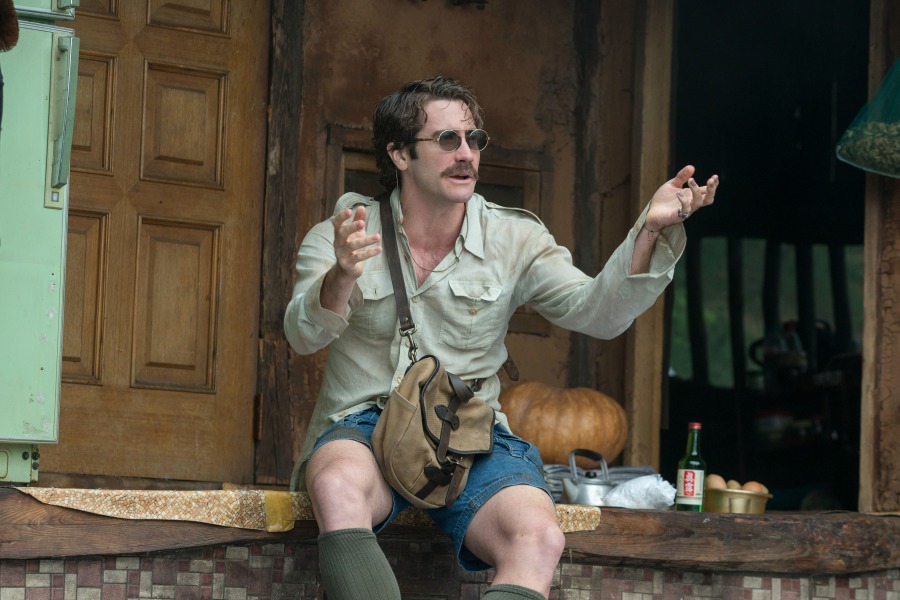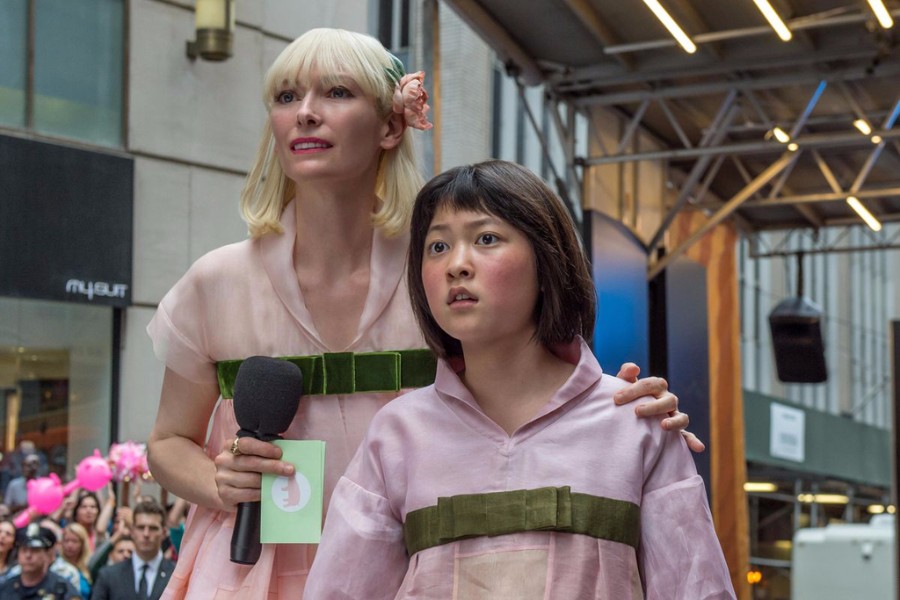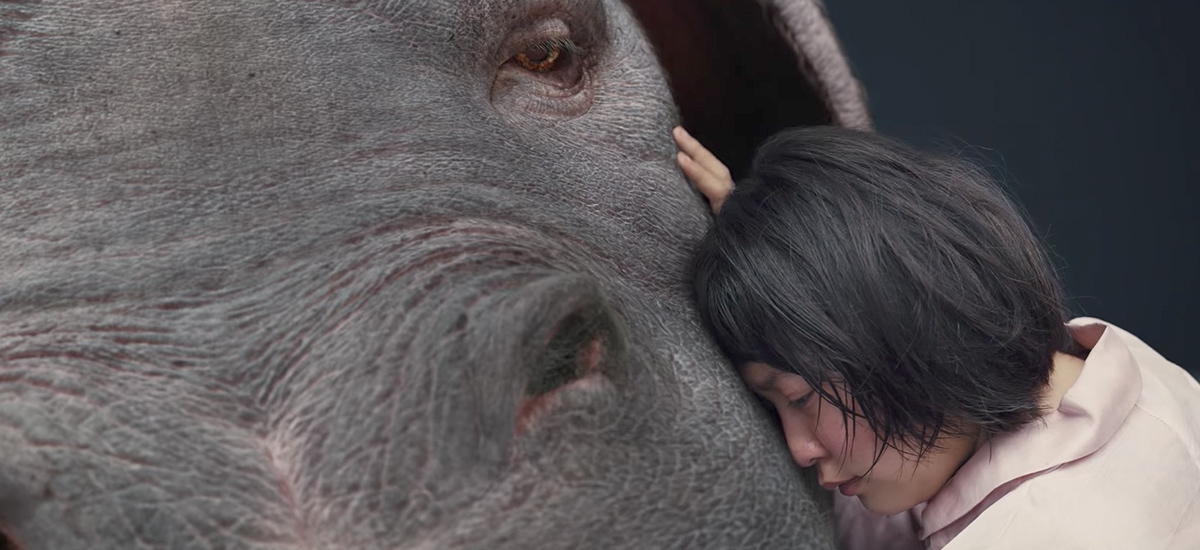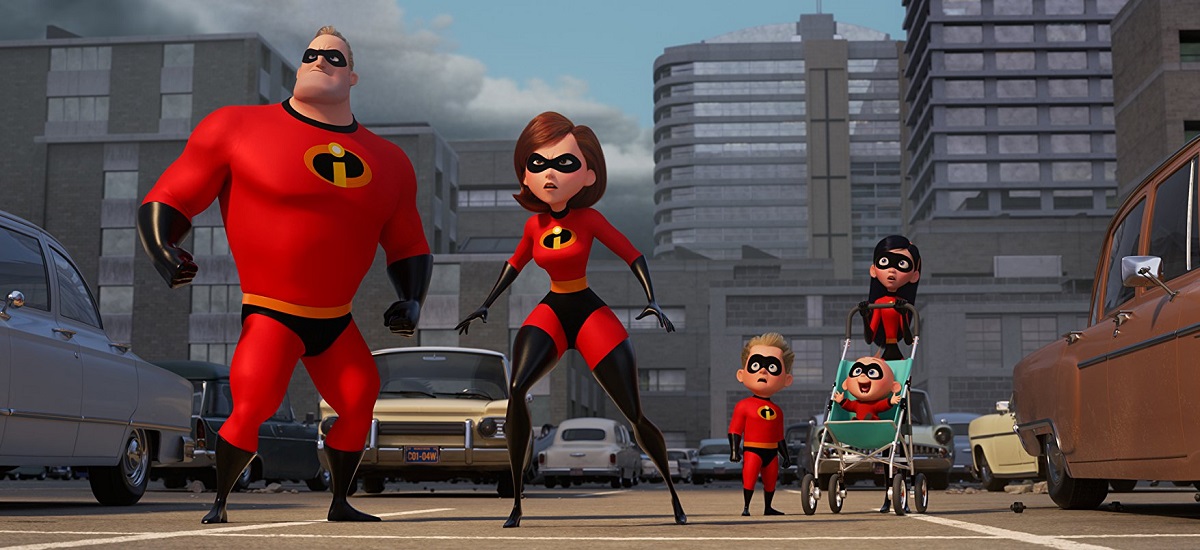Earlier this year at Cannes, a controversy of sorts erupted. Traditionalists bemoaned the fact that a film made through streaming giant Netflix was playing at the festival. In fact, many openly booed the film when it premiered. This is weird, given that the film in question, Bong Joon Ho’s Okja, is exactly the sort of cinematic experience festivals usually champion.
Part satirical corporate indictment, part expose of the meat industry, Okja is many things to many masters. For the majority of the time it finds itself sticking to the “fractured farcical fairy tale” sub genre. One that Ho seems suitably equipped to work within.
Tilda Swinton (in braces & a white Prince Valiant wig) is the peppy and exuberant Lucy Mirando, CEO of the Mirando Corporation. In the hopes of dispelling the psychotic shadow cast by her father and former CEO, Miranda unleashes the concept of “super pigs” upon the world.
These pigs were first found in Chile and are thought to possibly revolutionize the livestock world. They leave a minimal carbon footprint, eat less than normal animals, produce less excretions and taste good. As a PR move, she decides that 26 countries will raise their own piglet for decade. Then, in a soft of contest one super pig will be chosen , ostensibly to be the standard that all other future piglets are to meet.
The plan is brilliant, but met with a fair amount of skepticism given that most large companies never operate with this much transparency. But that’s all in due time.

Much like Snowpiercer, Bong Joon-Ho assembles an international cast of actors, each of whom brings something special to the table.
Swinton, always a chameleon, sinks her over-sized chompers into a stunted adult child, attempting to serve what she believes to be many masters. Paul Dano, often the most punchable face in the room, provides a sweet turn, as the quirky leader of an animal rights group.
Not to be outdone, Jake Gyllenhaalt gives his most unhinged, yet most enjoyable performance as Dr. Johnny. Imagine Jack Hannah as an emasculated coke-fiend and you’re right on the money.
Ahn Seo-Hyun is simply brilliant as Mija, the granddaughter of a farmer chosen to raise one of super piglets. Interjecting equal parts naivete, hope and reckless abandon, she creates a young heroine determined not to let her family be torn apart.
That plucky earnestness threatens to be snuffed out as events move to America. A darker and seedier underbelly is exposed, as Ho takes stabs not only at what price must be paid for the “American Dream”, but the meat industry in general. While it threatens to be rather on-the-nose, it doesn’t brunt the impact any.
Everything is a colorful shade of cynical in the world of Okja. All smiles mask some form of pain. Any good action is at the mercy of some darker ideal or corporate machination.
Everything in Okja has been meticulously teased or tweaked for maximum effect. Even with this state of heightened reality, the cinematography and score explode off the screen. Jaeil Jung turns an evocative and jaunty composition. Rather impressive for first time work. Behind the camera is Darius Khondji, otherwise known as “the best director of photography you’ve never heard of”. That’s a shame, seeing as how he’s the person responsible for City of Lost Children, Se7en, as well as this year’s City of Z.
Ho even decides to color outside the lines, pulling attention to things just out of focus. For such a such an intimate, if not at times sprawling, film, he stops and gives attention to the action in the background. It’s a small move, but one that nonetheless breathes extra life into proceedings.

What sets Okja apart from the regular summer rabble, isn’t how it’s being distributed, but its director, Bong Joon Ho. A master when it comes to juggling tones and genre-mashing.
With all the heady subject matter being thrown around, it may come as a surprise that quirk runs throughout the film. This doesn’t come across as twee simply for the sake of it, rather it feels like an attempted pull back from the darkness that rules the movie’s second half. Ho has a lot he wants to say, but he also understands that lessening
The misconception some may have with a Netflix-branded movie are quickly dispelled, as Okja proves very much to be a cinematic experience. In fact, most would be best served to seek out a way to see it in a theater if at all possible. Even so, the magic, heart, and stark bleakness that overtakes the second half of the movie are sure to excite even the harshest of critics. The tonal shift may be a bit much for some, but those that give Okja a chance will find one of the year’s biggest surprises.



